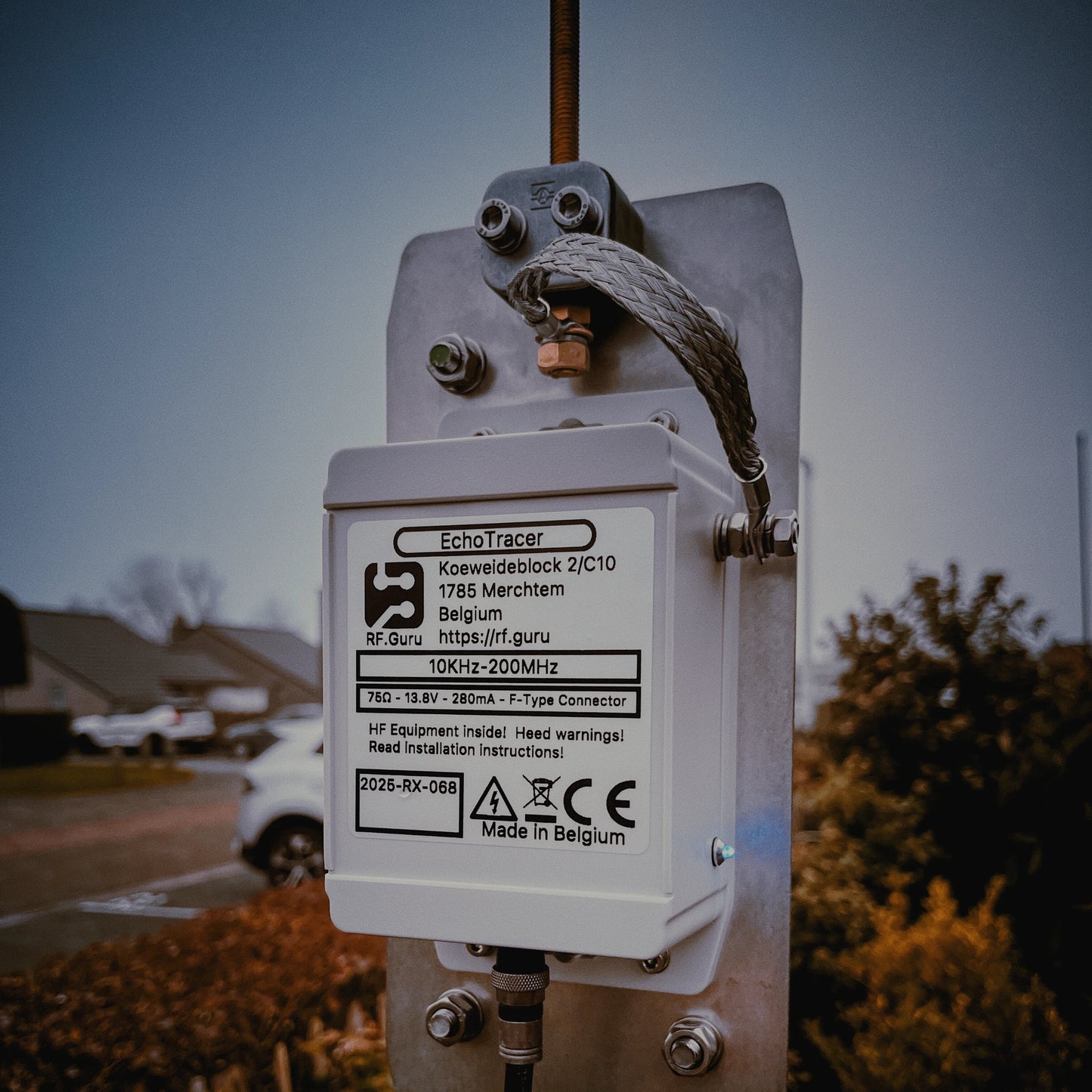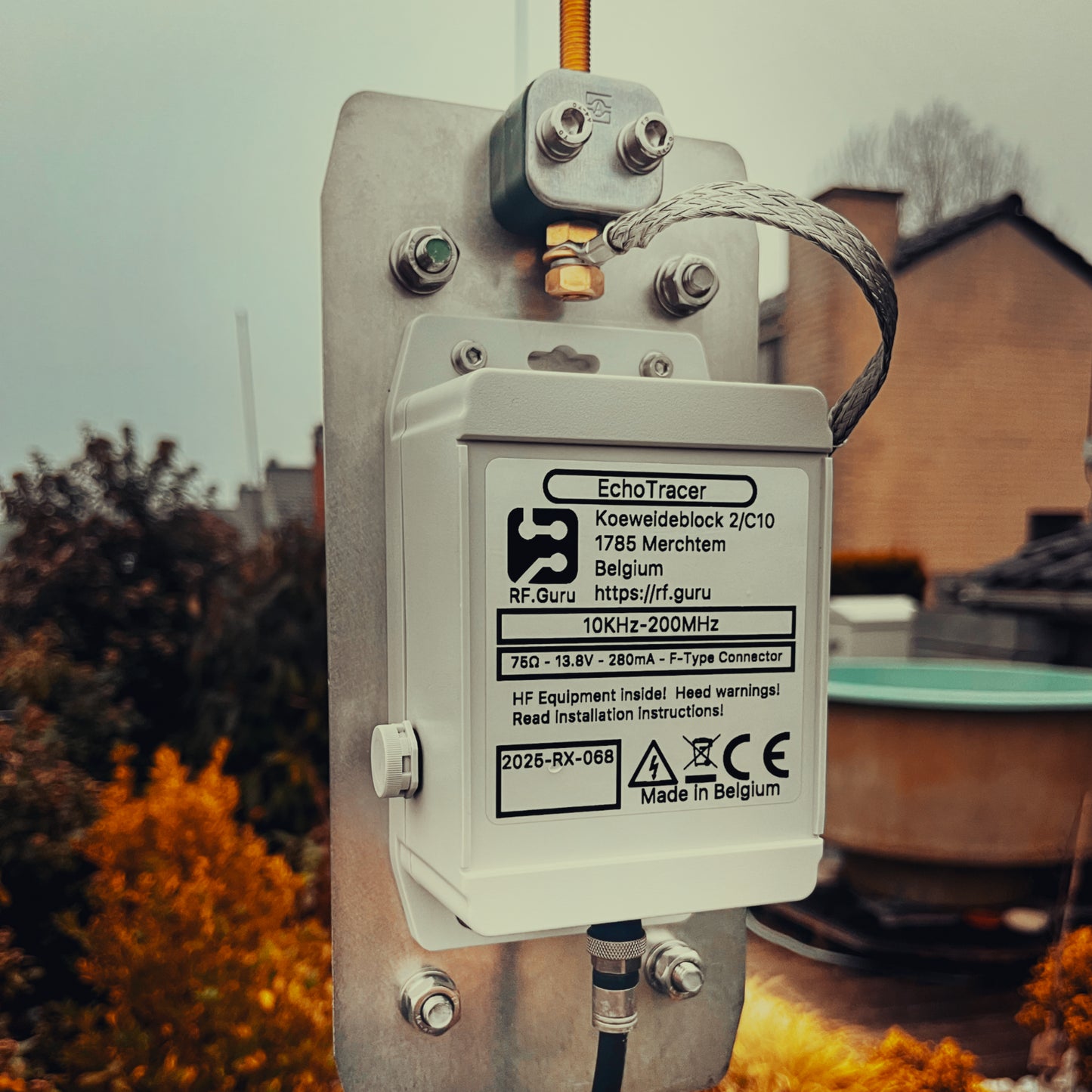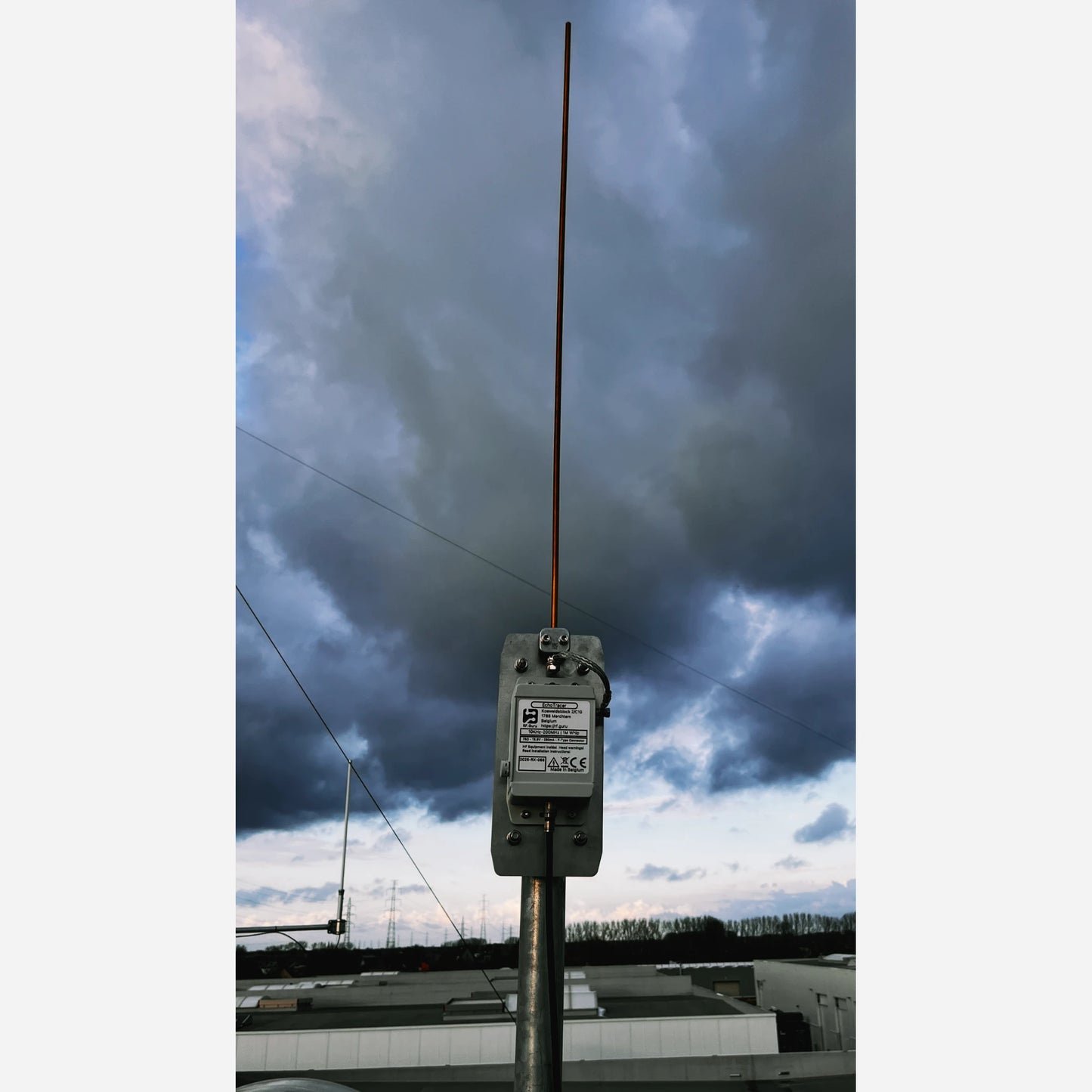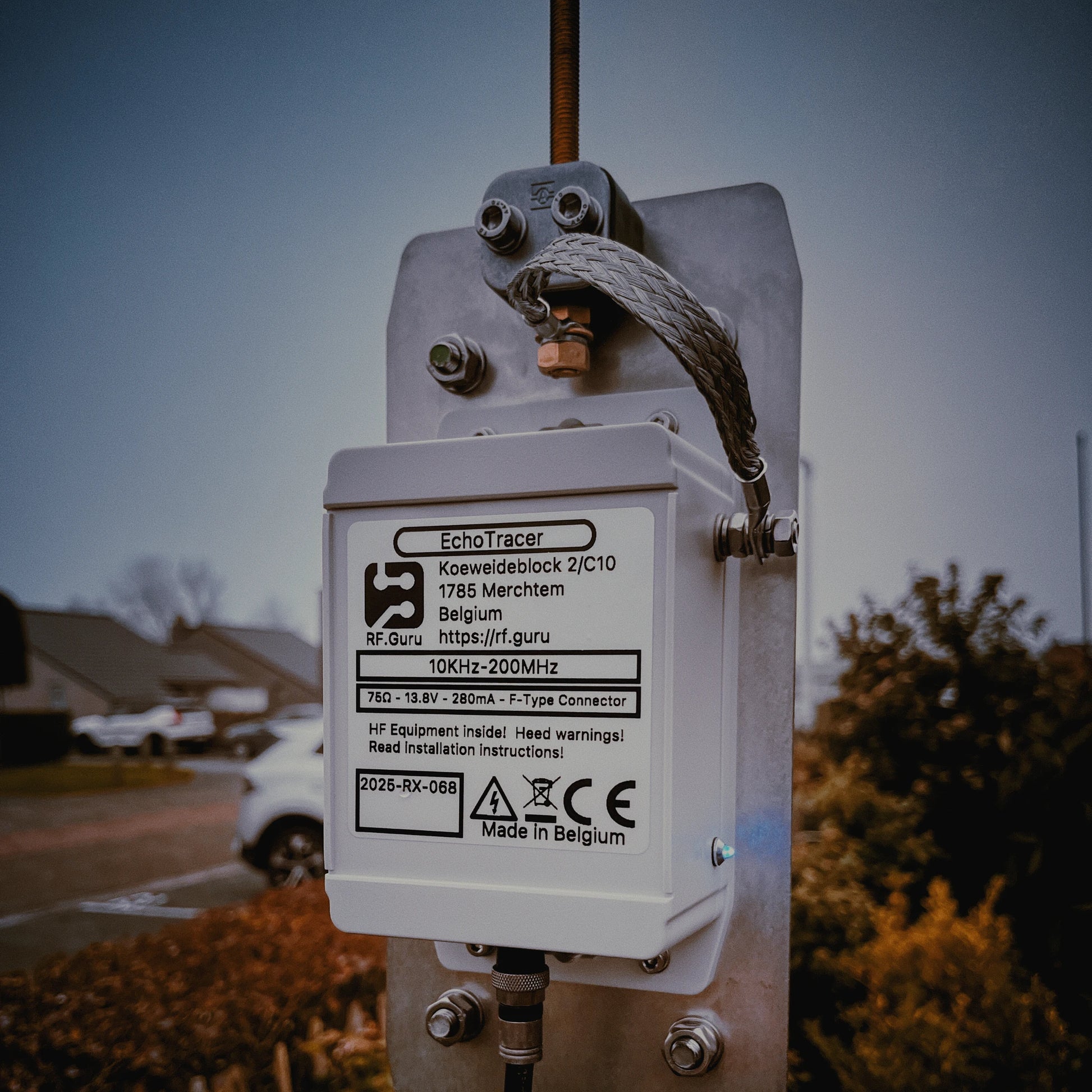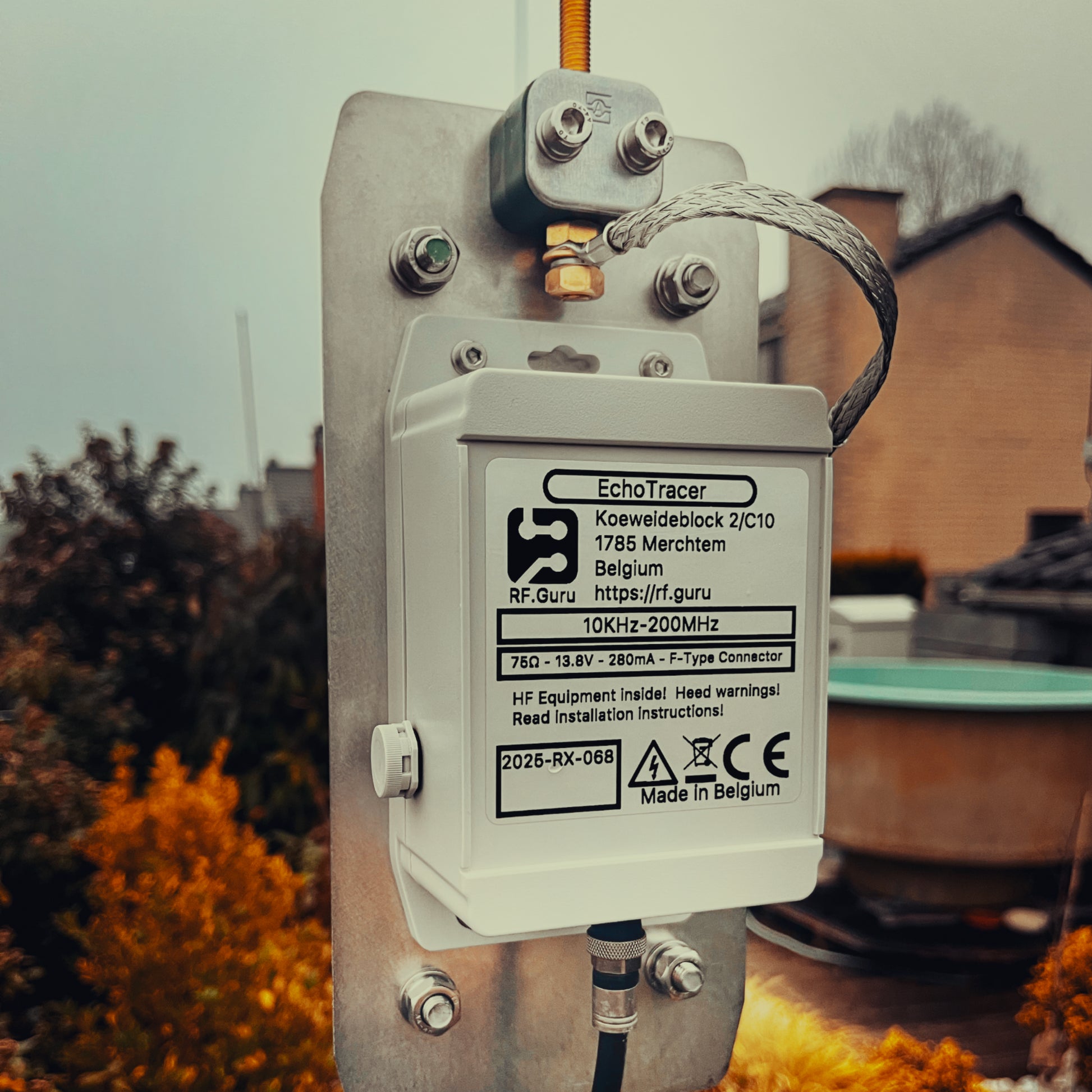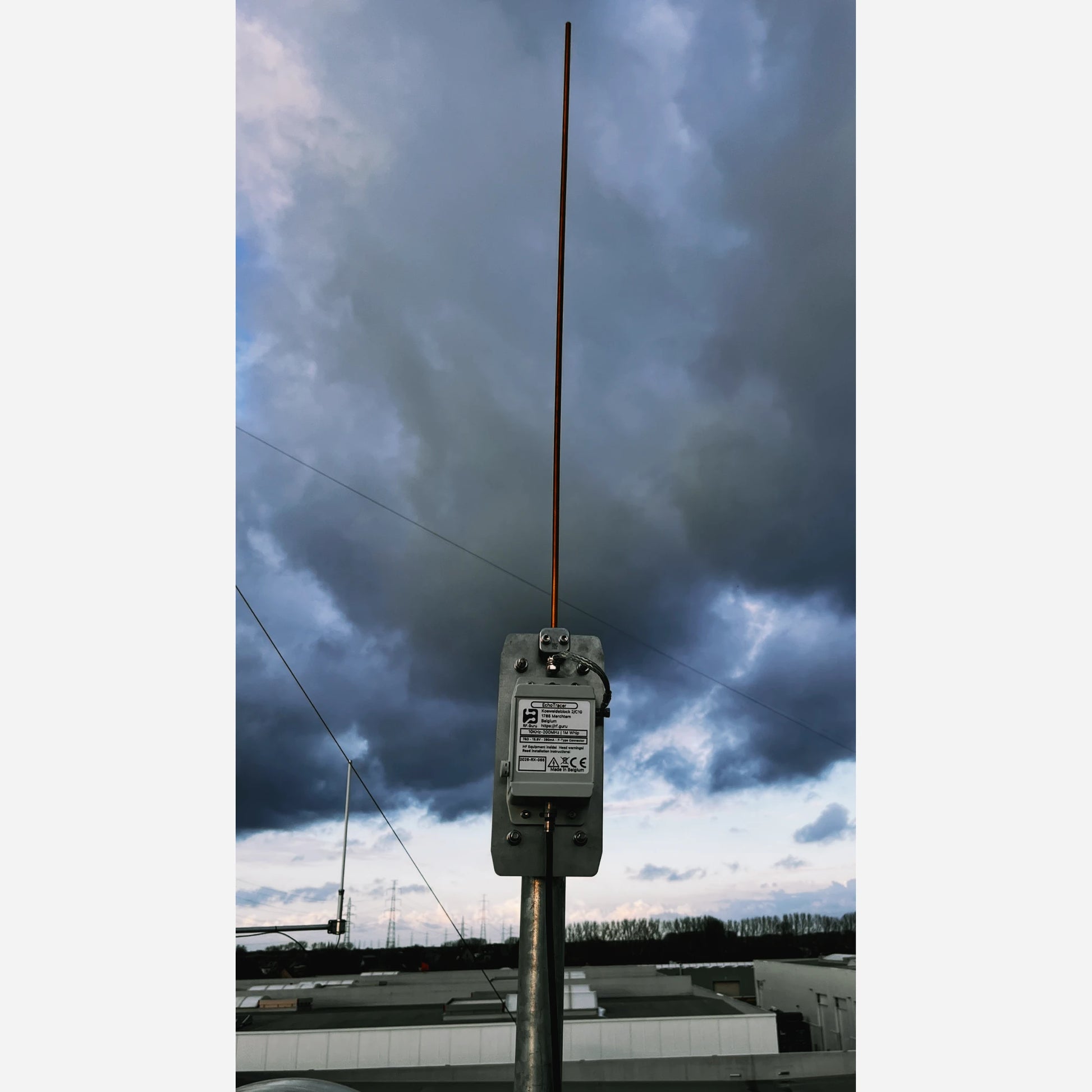RF Guru
EchoTracer3 — An active WideBand RX E-Probe — 10 KHz to 1.5 GHz
EchoTracer3 — An active WideBand RX E-Probe — 10 KHz to 1.5 GHz
Couldn't load pickup availability
If you order coax cables together with connectors, we will crimp the connectors for free before shipping.
Listen to our SDRs
Hear EchoTracer and our other antennas live on remote SDRs.
EchoTracer — Technical Overview
The Truth About Low Noise Figures
Comparison of Active RX Antennas
Clever Phasing — Why These Arrays
Why Most RX Antennas Excel at DX
The EchoTracer is a rugged, wideband E-field (e-probe) receive antenna covering 10 kHz to 1.5 GHz, with best performance from 160 m through 2 m. Default wideband HF setup: a 1 m RVS whip with top-loading hat for an excellent result from 10 kHz to 200 MHz (HF focus at ~3–5 m height). It’s miniwhip-class but with upgraded RF design, FM-notch filtering, integrated surge/ESD protection, and professional-grade mechanics for outdoor reliability.
Included
- EchoTracer (sealed enclosure)
- RVS (stainless) mounting plate
-
One of these whips:
- 1 meter RVS or Brass
-
1 meter RVS + Top-loading hat (best for wideband HF)
- Modular brass whip: 25 cm fixed + 25 cm & 50 cm extensions and 2 long nuts
Optional
- Bias-T of your choice
- RX 75 Ω Line Isolator with integrated ground peg (mast base)
- INTSAT-170-ELITE 75 Ω short run (1–10 m) from EchoTracer to the first isolator
- INTSAT-170-ELITE 75 Ω long run (feedline mast-to-shack)
- F-type connectors — 3× outdoor + 1× indoor (free crimping)
1) Short jumper (75 Ω, 1–10 m) from EchoTracer to Isolator #1 at mast base.
2) Long run of INTSAT-170-ELITE 75 Ω towards the shack.
3) Isolator #2 before coax enters the shack.
Order 3× outdoor + 1× indoor F connectors — we’ll crimp them for you.
Key Features
- Frequency range: 10 kHz – 1.5 GHz Default HF setup (1 m RVS + hat): best results from 10 kHz – 200 MHz.
- Noise figure @10 MHz: <1 dB typical
- Strong-signal handling: IP3 ~+36 dBm, P1dB ~+18 dBm
- Surge & ESD protection: gas discharge tube, transient suppressor, clamp diodes
- FM broadcast notch: ~20–25 dB attenuation of 88–110 MHz
- Output isolation: transformer + broadband common-mode choke
- TX tolerance: up to 2 kW at ~12 m distance
- Whip material options: brass (~+0.5 dB on VHF) vs RVS stainless (marine-grade durability)
- Power: 13.8 V via Bias-T, ~150–180 mA
Whip Length Recommendations
| Whip setup | Best use | Trade-off |
|---|---|---|
| 1 m RVS + top-loading hat (default) | 10 kHz – 200 MHz (HF focus) | Strongest wideband HF results at ~3–5 m height |
| 75 cm | < 400 MHz | Less lower-HF compromise vs 50 cm |
| 50 cm | < 600 MHz | More compromise on lower HF vs 75 cm / 1 m |
| 25 cm | 10 MHz – 1.5 GHz | Best choice when focusing on VHF/UHF up to 1.5 GHz |
Placement & Height
Install on a non-metallic mast away from buildings and noise sources. Typical heights:
• Wideband HF (1 m RVS + hat): ~3–5 m
• 20–10 m: ~2–3 m
• 6 m: ~8–10 m
• 4 m: ~6–8 m
• 100 MHz – 1.5 GHz: ~2–4 m
Metal roofs or conductive surfaces nearby can act as effective ground planes, improving coupling.
Maintenance
For outdoor installs, apply a thin layer of copper grease to all whip threads and extension joints before assembly. This prevents seizing/galling (especially with stainless), reduces corrosion, and keeps modular sections easy to remove after months outside. Copper grease is available in the complementary products above this description.
Tip: keep RF connectors clean and dry — do not apply grease inside the connector.
Technical Specs
| Parameter | Value |
|---|---|
| Frequency Range | 10 kHz – 1.5 GHz |
| Best Performance | HF focus: 10 kHz – 200 MHz (1 m + hat); overall coverage to 1.5 GHz |
| Noise Figure @10 MHz | ~<1 dB |
| Output IP3 | ~+36 dBm |
| P1dB | ~+18 dBm |
| Output Impedance | 75 Ω |
| TX Tolerance | Up to 2 kW @12 m distance |
| Supply | 13.8 V DC via Bias-T, 150–180 mA |
| Whip Options | 25 cm / 50 cm / 75 cm / 1 m (+ top-loading hat) |
| Polarization | Vertical (E-field) |
| Weight | ~1 kg |
| Operating Temp | −20 °C to +50 °C |
| Pole Mount | Ø 30–68 mm |
Mini-FAQ
- Which whip length should I choose? — 1 m + hat for HF (10 kHz–200 MHz), 75 cm (<400 MHz), 50 cm (<600 MHz), 25 cm (10 MHz–1.5 GHz).
- Can I use EchoTracer in phased arrays? — Yes, it’s compatible with EchoTriad and other phased E-probe systems.
- Does the FM notch affect 6 m? — No, the notch is narrow and above 50 MHz.
- Whip material difference? — Brass gives ~+0.5 dB at VHF; stainless is more durable.
- Nearby TX antennas? — Tolerant up to ~2 kW at 12 m. Keep practical spacing.
- How to ground? — Bond coax braid at mast base using ground peg for lower noise.
Share
